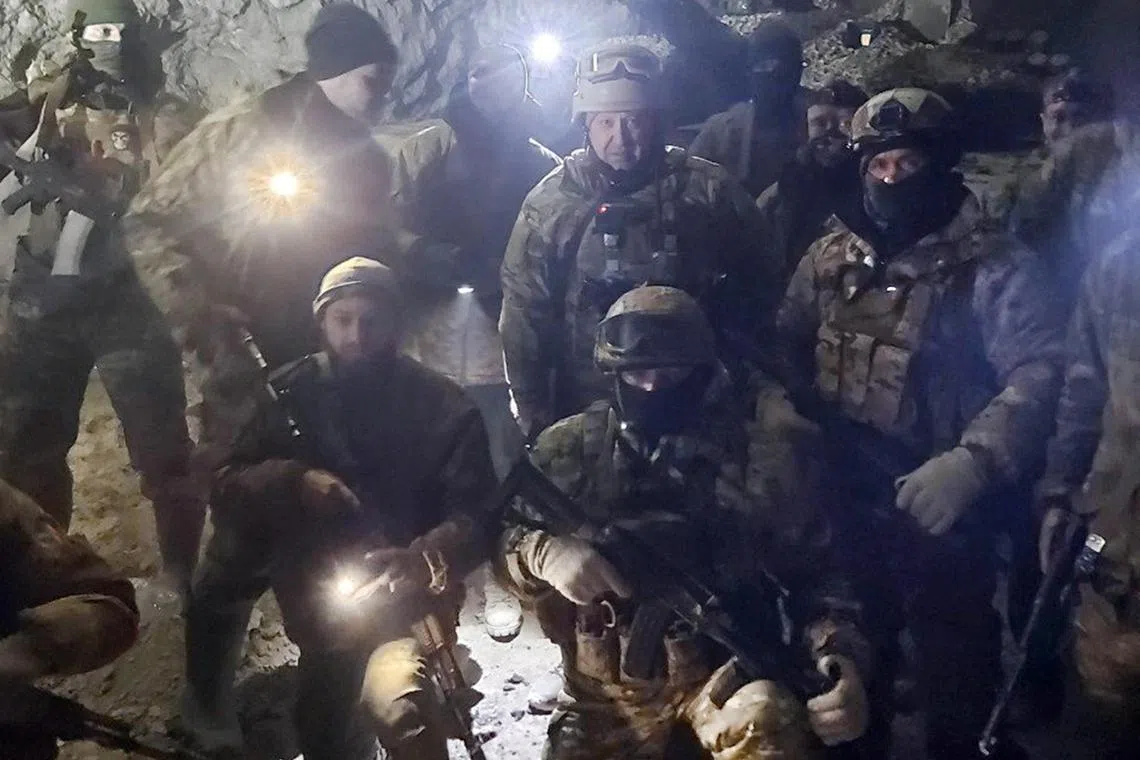‘Very dangerous people’: Russia’s convict fighters heading home after fighting in Ukraine
Sign up now: Get ST's newsletters delivered to your inbox

More than six months ago, Wagner Group began systematically recruiting convicts on a scale not seen since World War II.
PHOTO: REUTERS
Follow topic:
NEW YORK - He was released from a Russian prison and thrown into battle in Ukraine with a promise of freedom, redemption and money.
Now, Mr Andrei Yastrebov, who was among tens of thousands of convict soldiers, is part of a return from the battlefield, with potentially serious implications for Russian society.
Mr Yastrebov, 22, who had been serving time for theft, returned home a changed man.
“We all feel like he is in some sort of hypnosis, like he is a different person,” said a relative of his, who spoke on condition of anonymity for fear of reprisals. “He is without any emotions.”
Thousands of convicts have been killed, many within days or even hours of arriving at the front, Russian rights advocates and Ukrainian officials say. Those who survive and return home largely remain silent, wary of retribution if they speak out.
President Vladimir Putin’s decision to allow a mercenary group to recruit Russian convicts in support of his flagging war effort in Ukraine
Since July, about 40,000 inmates have joined the Russian forces, according to Western intelligence agencies, Ukraine’s government and a prisoners’ rights association – Russia Behind Bars – which combines reports from informers across Russian jails. Ukraine claims that nearly 30,000 have deserted or been killed or wounded, although that number could not be independently verified.
Most of the enlisted men were serving time for petty crimes such as robbery and theft, but records from one penal colony seen by The New York Times show that the recruits also included men convicted of aggravated rape and multiple murders.
“There are no more crimes, and no more punishments,” said Ms Olga Romanova, the head of Russia Behind Bars. “Anything is permissible now, and this brings very far-reaching consequences for any country.”
More than six months ago, Russia’s largest private military company, Wagner Group, and its founder, Mr Yevgeny Prigozhin, began systematically recruiting convicts on a scale not seen since World War II to bolster a bloody assault on the Ukrainian city of Bakhmut. Yet the operation remains largely cloaked in secrecy and propaganda.
Wagner has been able to avoid oversight by exploiting the most marginalised Russian citizens, the 350,000 male inmates of its harsh penal colonies, human rights activists and lawyers said.
Dozens of survivors from the first inmate assault units began filtering back to Russia in January with medals, big payouts and documents that Wagner claims grant them freedom.
The releases are likely to accelerate as Wagner’s six-month service contracts expire, potentially confronting Russian society with the challenge of reintegrating thousands of traumatised men with military training, a history of crime and few job prospects.
“These are psychologically broken people who are returning with a sense of righteousness, a belief that they have killed to defend the Motherland,” said Ms Yana Gelmel, a Russian prisoner rights lawyer who works with enlisted inmates. “These can be very dangerous people.”
Neither Mr Prigozhin, through his press office, nor Russia’s penal service provided comment.
To document the recruitment drive, the Times interviewed rights activists, lawyers, legal workers, relatives of recruited inmates, deserters and prisoners who decided to remain behind bars but maintain contact with companions on the front lines.
They described a sophisticated system of incentives and brutality built by Wagner, with the Kremlin’s support, to refill Russia’s decimated military ranks using questionable, and possibly illegal, methods.

Mr Andrei Yastrebov was among tens of thousands of convict soldiers.
PHOTO: AFP
Mr Andrei Medvedev said he joined Wagner within days of finishing his prison term for theft in southern Russia. A former convict with military experience, he says he was put in charge of a detachment of prisoners who were dispatched on nearly suicidal missions around Bakhmut.
“We were told: ‘Keep going until you’re killed’,” Mr Medvedev said in a phone interview from Russia after deserting in November. He has since escaped to Norway and applied for political asylum.
After spending just three weeks at home, Mr Yastrebov said he was already getting ready to return to the front, despite the extraordinary casualty rates suffered by his prison’s unit, according to Russia Behind Bars.
“I want to defend the Motherland,” he said in a brief interview last Friday. “I liked everything over there. The civilian life is boring.” NYTIMES

